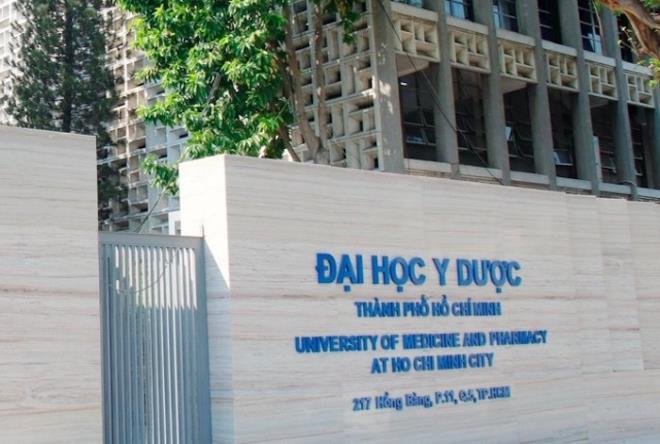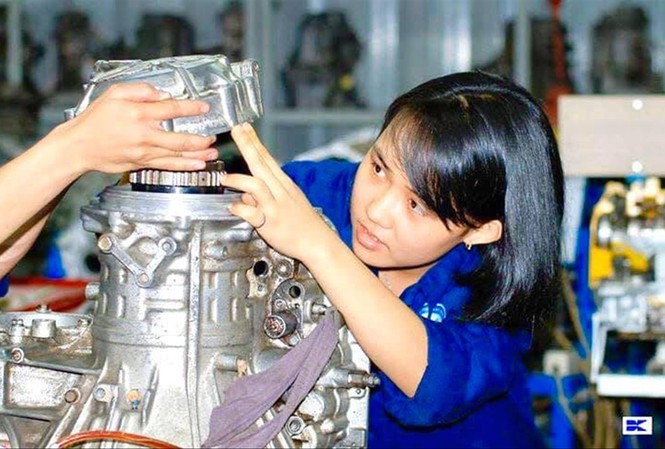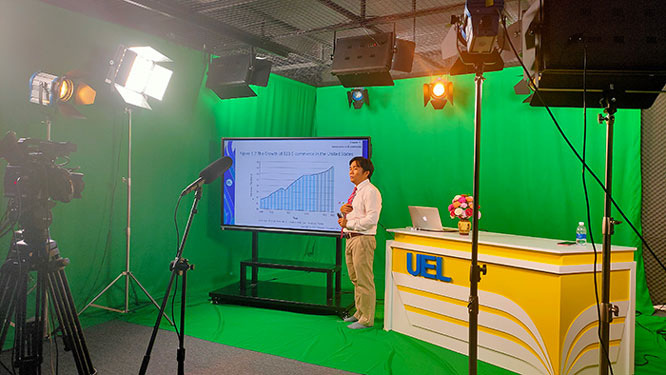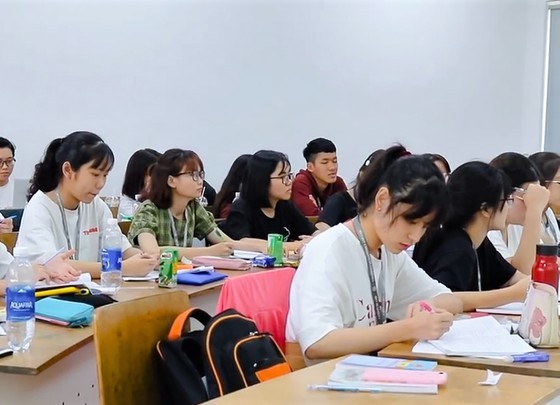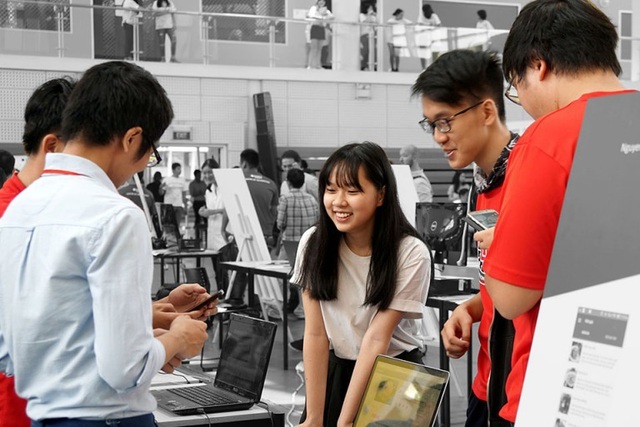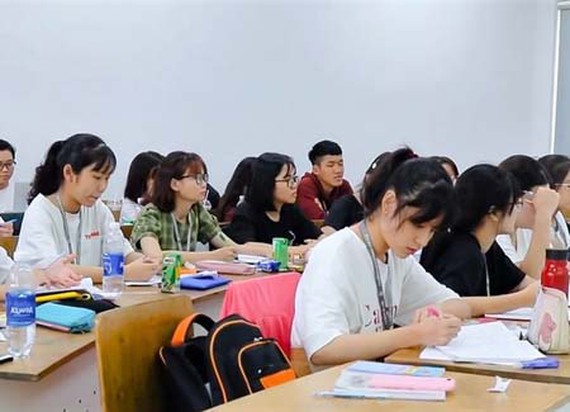- © Copyright of Vietnamnet Global.
- Tel: 024 3772 7988 Fax: (024) 37722734
- Email: evnn@vietnamnet.vn
higher education
Update news higher education
HCM City university to pay monthly living expense for PhD students
The International University-Vietnam National University Ho Chi Minh City has decided to pay doctoral students VND10 million (US$430) for monthly living expenses and waive tuition fees of up to 100 per cent in the 2020-21 academic year.
Ministry of Education and Trainning develops standard for universities
 The Ministry of Education and Training is to implement the Vietnam National Qualifications Framework (VQF).
The Ministry of Education and Training is to implement the Vietnam National Qualifications Framework (VQF).
Enjoying financial autonomy, medical schools raise tuition
 Experts affirmed that with low costs, medical schools will not be able to produce high-quality doctors.
Experts affirmed that with low costs, medical schools will not be able to produce high-quality doctors.
High tuition at medical schools puts poor students at disadvantage
 The announcement by the HCM City University of Medicine and Pharmacy on raising tuition by five times has stunned the public.
The announcement by the HCM City University of Medicine and Pharmacy on raising tuition by five times has stunned the public.
PhD training: higher requirements set on students and instructors
 The number of articles published in international publications by Vietnam’s higher education establishments has increased by three times compared with seven years ago.
The number of articles published in international publications by Vietnam’s higher education establishments has increased by three times compared with seven years ago.
High-quality programs at many universities enroll sub-par students
 The State Audit, when working with the Ministry of Education and Training (MOET), named a number of schools which enroll students of low quality for high-quality training programs.
The State Audit, when working with the Ministry of Education and Training (MOET), named a number of schools which enroll students of low quality for high-quality training programs.
VN universities to change enrollment plans
 The Ministry of Education and Training (MOET) is collecting opinions from universities on its draft regulation for higher education enrollment in 2020. Schools will draw up their enrollment plans based on the regulation.
The Ministry of Education and Training (MOET) is collecting opinions from universities on its draft regulation for higher education enrollment in 2020. Schools will draw up their enrollment plans based on the regulation.
Education Ministry sets tough rules for schools to organize their own entrance exams
 The Ministry of Education and Training (MOET) has set very strict requirements for universities to organize entrance exams of their own.
The Ministry of Education and Training (MOET) has set very strict requirements for universities to organize entrance exams of their own.
Online teaching: long-term investments needed
 Non-state education establishments had to close the doors during the epidemic, but some of them began using online teaching activities.
Non-state education establishments had to close the doors during the epidemic, but some of them began using online teaching activities.
Vietnam’s schools to carry out digital transformation
 Though they have complained about the challenges of organizing online training, schools agree that now is the right time to digitize university education.
Though they have complained about the challenges of organizing online training, schools agree that now is the right time to digitize university education.
Upland girl overcomes mountains to pursue education
 Chao Thi Yen, a young woman from the Dao Tuyen ethnic minority in northwest Vietnam has defied challenges to become the first woman from her community to earn a master’s degree abroad through a full-degree scholarship
Chao Thi Yen, a young woman from the Dao Tuyen ethnic minority in northwest Vietnam has defied challenges to become the first woman from her community to earn a master’s degree abroad through a full-degree scholarship
E-learning to become part of higher education
 Universities have had to provide lectures online as a temporary solution during the COVID-19 pandemic, but experts believe that e-learning will become an indispensable part of higher education in Vietnam.
Universities have had to provide lectures online as a temporary solution during the COVID-19 pandemic, but experts believe that e-learning will become an indispensable part of higher education in Vietnam.
Vietnamese students write graduation theses per orders from enterprises
 The topics of many graduation theses are coming from the ideas of users or projects ordered by enterprises.
The topics of many graduation theses are coming from the ideas of users or projects ordered by enterprises.
In soft skills training, efforts from many parties required
 Learning to know, learning to do, learning to be, and learning to live together are the four pillars of learning as defined by UNESCO.
Learning to know, learning to do, learning to be, and learning to live together are the four pillars of learning as defined by UNESCO.
Training costs at state-owned schools no longer low
 Low training costs are one of the reasons for many students to enroll in state-owned universities, but the tuition of the schools is increasing.
Low training costs are one of the reasons for many students to enroll in state-owned universities, but the tuition of the schools is increasing.
VN universities hesitate to give lectures online
 Many schools are not thinking of organizing online classes while others have tried to give lectures online, but said that there were many problems.
Many schools are not thinking of organizing online classes while others have tried to give lectures online, but said that there were many problems.
VN schools rush to run high-quality training programs that charge more tuition
 In 2006, a national key project hosted by the Ministry of Education and Training (MOET) was launched and applied on a trial basis at 10 key universities in Vietnam.
In 2006, a national key project hosted by the Ministry of Education and Training (MOET) was launched and applied on a trial basis at 10 key universities in Vietnam.
Vietnam needs to re-organize the education ministry?
 The proposal by the Ministry of Interior Affairs (MIA) to re-organize the Ministry of Education and Training (MOET) has raised controversy.
The proposal by the Ministry of Interior Affairs (MIA) to re-organize the Ministry of Education and Training (MOET) has raised controversy.
High-quality programs of tertiary education showing weaknesses
 The policy to organize high-quality programs in universities nationwide was introduced in 2006 to increase competitiveness among domestic educational institutes.
The policy to organize high-quality programs in universities nationwide was introduced in 2006 to increase competitiveness among domestic educational institutes.
Vietnamese universities to raise admission criteria
 The Ministry of Education and Training (MoET) states that in the upcoming academic year, universities in Vietnam must stop using unsuitable subject combinations to accept new students.
The Ministry of Education and Training (MoET) states that in the upcoming academic year, universities in Vietnam must stop using unsuitable subject combinations to accept new students.



